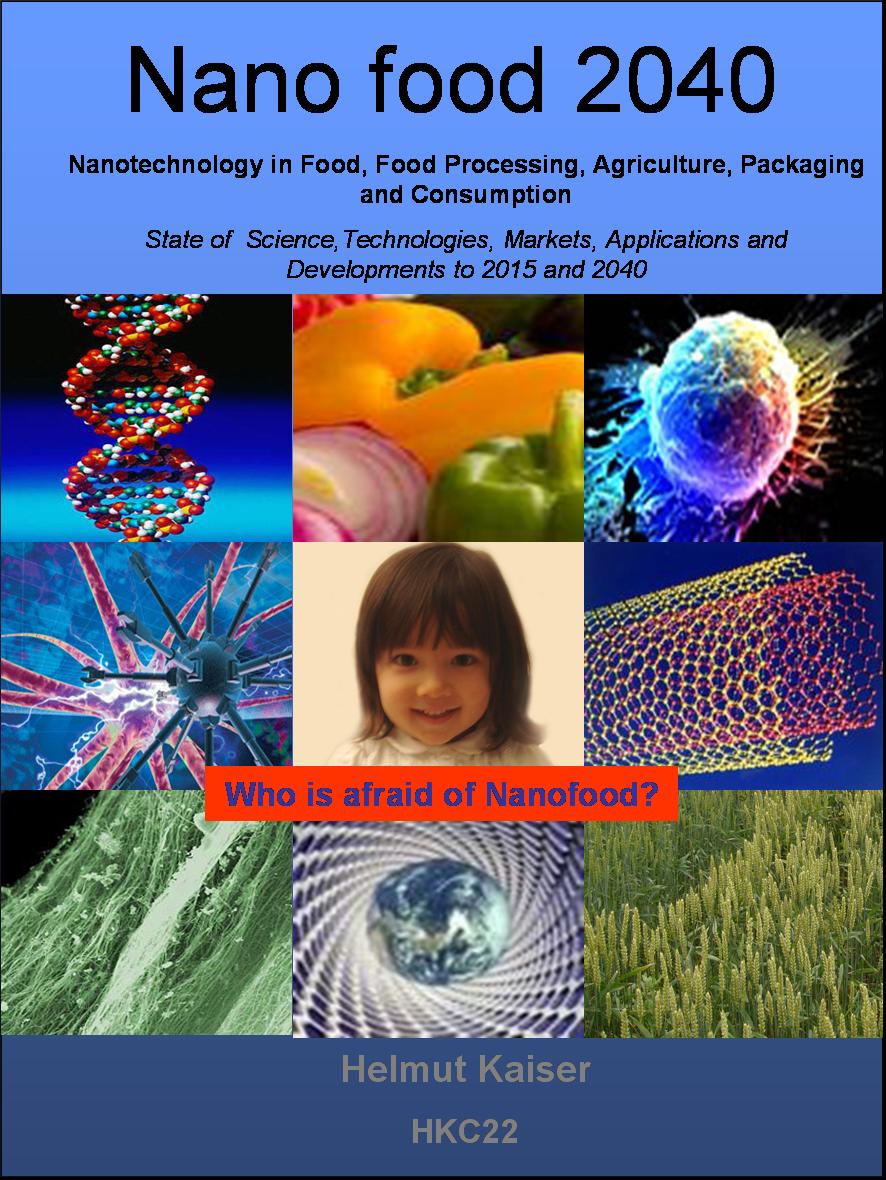Nanotechnology in Food, Foodprocessing , Agriculture, Packaging and Consumption
State of Science,Technologies, Markets, Applications and Developments to 2018 to 2040
Nanofood and vegetable-based meat products rise to $ 150 billion in 20 years.By 2040, only 40 percent of the meat products consumed will come from animals.
However, they expect new meat alternatives and cultured meat from the lab to supplant ordinary meat and their market share to grow to 49 percent of the total meat market by 2040.
Helmut Kaiser Consultancy is the leader in Nanofood Research
The latest study by hkc22.com shows that food production and consumption will change dramatically within the next 20 years. Water problems, energy use and climate change are the key reasons besides increasing population from 6 billion to expected 9 billion.
More than 60% of the water used worldwide is for food production. More than the 20% of the methane comes from agriculture and stock breeding. 30% of the total transportation is food and contributes to global warming. The total transport counts for 60% of the world’s CO2 emissions.
Millions of people today do not have enough food and it will be worse in the future. For many people food are not available, although there are enough supplies somewhere else. Most people around the world will welcome the possibility to shape food on a molecular level, because it will be locally available everywhere around the world.
More and more food companies and agriculture are aware about this future development and work on concepts to enter the science and technologies. Most companies do not talk about this development because the consumer is afraid.
2040 will be the common use of nanoproduced food, which has the correct nutritional composition and the same taste and texture of organically produced food, means that the availability of food is no longer affected by limited resources, bad crop weather, water problems or others.
Helmut Kaiser Consultancy has produced in 1999 the first analyses, in 2004/2005 the second and in 2019 the current level of nano food research portfolio worldwide, estimates on possible areas and timeframes for commercialization, and has a deep look at potential benefits and risks. Explain applications, markets and developments to 2040. This book has more then 300 pages.
Nanotechnology will have an impact on the food industry, from how food is grown and produced, processed to how it is packaged, transported and consumed. Companies are developing nanomaterials that will make a difference not only in the taste of food, but also in food safety, and the health benefits food delivers. Nanotechnology will transform the entire food industry in the next 20 years. In agriculture, it portends various applications aimed at reducing pesticide and water use, improving plant and animal breeding, and creating nano-bioindustrial products.
A report last year by the Helmut Kaiser Consultancy estimated that the worldwide nanotech food market may total $20.4 billion by 2020 and increase the speed of growth.
While there is lots of opportunities for using nanotechnology to improve food production, packaging, and quality, there is also some concern about how this will play out. However this developement is part of our molecular future.
Nanotechnology involves creating and manipulating organic and inorganic matter at the nanoscale. It promises to provide the means for designing nanomaterials; materials with tailor-made physical, chemical and biological properties controlled by defined molecular structures and dynamics. The present molecular biology techniques of genetic modification of crops are already forms of what has been termed nanotechnology. Nanotechnology can provide for the future development of far more precise and effective methods of, and other forms of, manipulation of food polymers and polymeric assemblages to provide tailor-made improvements to food quality and food safety. Nanotechnology promises not only the creation of novel and precisely defined material properties, it also promises that these materials will have self-assembling, self-healing and maintaining properties.
Some example applications:
NanoFood:
Nanocapsules and nano-objets for "on demand" preservatives, enriched food, flavour, smell, taste and colours
Interactive food: attractive surface treatment, glaziers and colours,
Improvement of food safety and quality, Extension of products shelf-life
Nanotechnology for Food processing
Nanocontrol of healthy digestion tube and micro-flora, digestion more compatible food
Improved cooking, control of food ingredients
Alternative feeding : transmucosal, skin etc..
Special Food: Hospital Food, Space Food, Hot and Cold areas Food
Controlled extraction and release nanoparticles
Nanocarriers for food and delivery of nutrients
and more...
Packaging:
Nanotechnology gas, UV barriers, mechanically and temperature reinforced foils and packaging (nanoclays, nanoparticles, nanopolymers, composites, nanocavities and strings), anti-microbial, breathable, multifunctional packaging
Magnetic nanocomposite for tag sensors
Nano-particle filled polymers
Enhancement of durability and usability of plastic packaging
Nano-additives for improved functionality (strength,barriers, water resistance, absorbency)
Nanoprinted, Intelligent packaging, Controlled Release, Nano-additives, Nanocoding of plastics and paper materials for authentication& identification purposes
Radio Frequency Identification RFID, Monitoring Tagging, Trade Mark & Fraud protection, improved supply chain efficiency, nanoBarcodes
In situ sensor food quality monitoring (eg. colour), control and nutraceuticals delivery, Paper and plastics with sensing ability, Portable DNA/protein chips for food quality tests
Special Beverage packaging
Fibre coatings with polymer nanocomposites
Extreme condition packaging (hot, cold, aerospace areas)
Self Cleaning Packaging and Antibacterial Productions Site Surfaces
and more..
NanoAgriculture:
Nanotechnology for Controlled Environment Agriculture: "smart" pesticides delivery, Control of Crops, Animal Food and Health, control of microbial and chemical contamination, complete plant health monitoring
Extreme conditions agriculture (Space, Cold, Hot areas)
and more..
Order and Costs
The total study is 4,900.- Euro, the summary is 3,200.- Euro. Parts of the study by request.
To order please send to email
Copyright hkc22.com 2019


